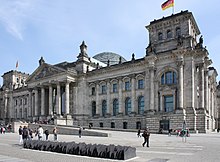Paul Gerlach (politician, 1888)
Paul Gerlach (born April 19, 1888 in Berlin ; † October 10, 1944 in Sachsenhausen concentration camp ) was a social democratic politician and a victim of National Socialism .
Life
After primary school, Gerlach did an apprenticeship as a typesetter and worked in the profession he had learned until 1910. Then he was editor and branch manager of the social democratic Volksstimme in Iserlohn until 1912 . During this time Gerlach was also a board member of the local SPD. In the following years until 1915 he was the editor of the Volkszeitung in Düsseldorf . From 1915 to 1918 Gerlach participated in the war. He left the army severely disabled in the war . After that he was initially again an editor at the Volkszeitung and later at the Free Press, which also appears in Düsseldorf.
In 1922 Gerlach switched to public service. Until 1933 he worked as a regional councilor in the Rhenish provincial administration. There he was head of the main welfare office for disabled people. From 1932 he was also editor of the magazine "Die Wohlfahrtspflege im Rheinland".
In the SPD, Gerlach was chairman of the Lower Rhine district from 1926 to 1933. He was also Gauleiter of the Reichsbanner Schwarz-Rot-Gold . In Düsseldorf Gerlach was a co-founder of the Arbeiterwohlfahrt , of which his wife Hedwig Gerlach became the first chairman. Paul Gerlach was instrumental in setting up a district organization of the AWO for the Rhineland and was chairman from 1925.
For his party he was a city councilor in Düsseldorf from 1918 to 1928. In addition, Gerlach was a member of the Rhenish Provincial Parliament from 1919 to 1933 and a deputy member of the Reichsrat from 1921 to 1933 . In addition, Gerlach was a member of the Reichstag from 1928 to 1933 .
In the last years of the republic, Gerlach spoke out decisively against the NSDAP . In 1932 the National Socialists tried in vain to report him after an event by the Iron Front for high treason and to have him suspended from duty. After the beginning of National Socialist rule , he was released, taken into “ protective custody ” and temporarily imprisoned in the Lichtenburg concentration camp . Another arrest took place in 1935. Gerlach was arrested again in August 1944 as part of the "Grid" campaign . Initially imprisoned in Magdeburg prison, he was later transferred to Sachsenhausen concentration camp, where he also died.
Honors
After the war, Paul Gerlach gave the AWO its name to the Paul-Gerlach-Bildungswerk. Since 1992 one of the 96 memorial plaques for members of the Reichstag murdered by the National Socialists has been commemorating Gerlach in Berlin near the Reichstag . In front of the house at Unterrather Straße 185, Gerlach's last residence in Düsseldorf, a stumbling block was laid in 2016 , reminding of his life and work.
literature
- Social Democratic Party of Germany (ed.): Committed to freedom. Memorial book of the German social democracy in the 20th century. Marburg 2000, ISBN 3-89472-173-1 , p. 111f.
- Martin Schumacher (Hrsg.): MdR The Reichstag members of the Weimar Republic in the time of National Socialism. Political persecution, emigration and expatriation, 1933–1945. A biographical documentation . 3rd, considerably expanded and revised edition. Droste, Düsseldorf 1994, ISBN 3-7700-5183-1 .
Web links
- Biography of the Paul-Gerlach-Bildungswerk
- Paul Gerlach in the database of members of the Reichstag
- Paul Gerlach's biography . In: Wilhelm H. Schröder : Social Democratic Parliamentarians in the German Reich and Landtag 1876–1933 (BIOSOP)
- Paul Gerlach's biography . In: Heinrich Best and Wilhelm H. Schröder : Database of Members of the National Assembly and the German Reichstag 1919–1933 (Biorab – Weimar)
| personal data | |
|---|---|
| SURNAME | Gerlach, Paul |
| BRIEF DESCRIPTION | German politician (SPD), MdR |
| DATE OF BIRTH | April 19, 1888 |
| PLACE OF BIRTH | Berlin |
| DATE OF DEATH | October 10, 1944 |
| Place of death | Sachsenhausen concentration camp |

